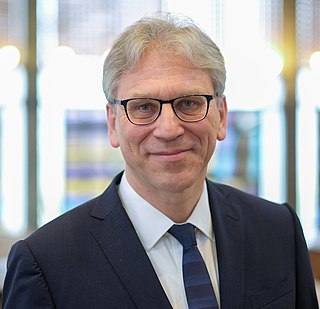
The World Council of Churches (WCC) is a worldwide Christian inter-church organization founded in 1948 to work for the cause of ecumenism. Its full members today include the Assyrian Church of the East, the Oriental Orthodox Churches, most jurisdictions of the Eastern Orthodox Church, the Old Catholic Church, the Lutheran churches, the Anglican Communion, the Mennonite churches, the Methodist churches, the Moravian Church, Mar Thoma Syrian Church and the Reformed churches, as well as the Baptist World Alliance and Pentecostal churches. Notably, the Catholic Church is not a full member, although it sends delegates to meetings who have observer status.

Bartholomew I is the 270th archbishop of Constantinople and Ecumenical Patriarch, since 2 November 1991. In accordance with his title, he is regarded as the primus inter pares in the Eastern Orthodox Church, and as the spiritual leader of the Eastern Orthodox Christians worldwide.

The World Evangelical Alliance (WEA) is an interdenominational organization of evangelical Christian churches, serving more than 600 million evangelicals, founded in 1846 in London, England, United Kingdom to unite evangelicals worldwide. WEA is the largest international organization of evangelical churches. The headquarters are in Deerfield, Illinois, with UN offices in New York City, Geneva, and Bonn. It brings together 9 regional and 143 national evangelical alliances of churches, and over one hundred member organizations. Moreover, the WEA includes a certain percentage of individual evangelical Christian churches. As of March 2021, the Secretary General of the WEA is German theologian Thomas Schirrmacher.
The Baptist World Alliance (BWA) is an international Baptist organization with an estimated 51 million people in 2022 with 246 member bodies in 128 countries and territories. A voluntary association of Baptist churches, the BWA accounts for about half the Baptists in the world. It is the 8th largest Christian communion.
The World Student Christian Federation (WSCF) is a federation of autonomous national Student Christian Movements (SCM) forming the youth and student arm of the global ecumenical movement. The Federation includes Orthodox, Protestant, Catholic, Pentecostal and Anglican students.

Medicus Mundi International (MMI) is a Network of public interest organisations working in the field of international health cooperation and advocacy. The Network members fight global poverty by promoting access to health and health care as a fundamental human right (“Health for All”). The Network aims at enhancing the quality and effectiveness of the work of its members and their partners through sharing know-how and joining forces. Key fields of joint activity include global health policy and governance (MMI is an organization in official relations with the World Health Organization) and the improvement of legitimacy, relevance and effectiveness of international health cooperation.
Norwegian Church Aid is a Norwegian humanitarian and ecumenical organisation with headquarters in Oslo. It was traditionally affiliated with the state Church of Norway, but is now independent. Norwegian Church Aid works together with people and organisations across the world to eradicate poverty and injustice.
The Reformed Ecumenical Council (REC) was an international organization of Calvinist churches. It had 39 member denominations from 25 countries in its membership, and those churches have about 12 million people together. It was founded August 14, 1946 in Grand Rapids, Michigan as the Reformed Ecumenical Synod. The Reformed Ecumenical Council was the second largest international Calvinist alliance and the more conservative of the two largest. In 1953, The Reformed Ecumenical Synod meeting in Edinburgh decided to advise its member churches not to join the World Council of Churches as currently constituted because it “permits essentially different interpretations of its doctrinal basis, and thus the nature of the Christian faith” and “represents itself as a Community of faith, but is actually not this” due to member churches holding “basically divergent positions.” About two-thirds of REC member churches also belonged to the larger World Alliance of Reformed Churches (WARC). The seat of the Reformed Ecumenical Council was Grand Rapids, Michigan, United States.

Cycling advocacy consists of activities that call for, promote or enable increased adoption and support for cycling and improved safety and convenience for cyclists, usually within urbanized areas or semi-urban regions. Issues of concern typically include policy, administrative and legal changes ; advocating and establishing better cycling infrastructure ; public education regarding the health, transportational and environmental benefits of cycling for both individuals and communities, cycling and motoring skills; and increasing public and political support for bicycling.

A Bible society is a non-profit organization, usually nondenominational in makeup, devoted to translating, publishing, and distributing the Bible at affordable prices. In recent years they also are increasingly involved in advocating its credibility and trustworthiness in contemporary cultural life. Traditionally Bible society editions contain scripture, without any doctrinal notes or comments, although they may include non-sectarian notes on alternate translations of words, or variations in the different available manuscripts.

Karapatan Alliance Philippines is a left-wing non-governmental organization and human rights alliance that conducts research and advocacy of human rights campaigns as well as monitoring and documentation of human rights violations in the Philippines, particularly in the context of the Philippine government's campaign against the communist insurgency in the country and the peace negotiations between the Philippine government and the National Democratic Front of the Philippines.

The National Council of Churches in the Philippines is a fellowship of ten Protestant and non Roman Catholic Churches in the Philippines denominations, and ten service-oriented organizations in the Philippines. A member of the World Council of Churches and the Christian Conference of Asia, the NCCP represents close to twelve million Protestant adherents. Advocacy for environmental protection and against large-scale mining are part of its core mission. Christian organizations other than churches may be received as associate members.

The Bangladesh Baptist Fellowship (BBF) is a national cooperative association of Baptist churches in Bangladesh. It was formed in 1920 as the East Bengal Baptist Union. The BBF is today the largest Baptist body in Bangladesh.
The Dicastery for Promoting Christian Unity, previously named the Pontifical Council for Promoting Christian Unity (PCPCU), is a dicastery within the Holy See whose origins are associated with the Second Vatican Council which met intermittently from 1962 to 1965.

Olav Fykse Tveit is a Norwegian Lutheran theologian and bishop, and the current Preses of the Bishops' Conference of the Church of Norway. He was elected to the post of general secretary of the World Council of Churches on 27 August 2009. He entered office on 1 January 2010, for a proposed term of five years, and was re-elected to a second term in July 2014. He resigned from the post in March 2020, having been elected Preses of the Bishops' Conference of the Church of Norway.
The Ecumenical Centre in Geneva, Switzerland, is located in the vicinity of the International Labour Organization, International Red Cross and Red Crescent Movement, and the World Health Organization and serves as the base for the following church organizations:
The Alliance for Space Development is a space advocacy organization dedicated to influencing space policy towards the goal of permanent human settlements in space. The founding executive members of the Alliance are the National Space Society and the Space Frontier Foundation. Member organizations of the Alliance are the Lifeboat Foundation, Mars Foundation, Mars Society, The Moon Society, Space Development Foundation, Space Development Steering Committee, Space For Humanity, Space Renaissance USA, Space Tourism Society, Students for the Exploration and Development of Space, Students on Capitol Hill, Tea Party in Space, and Waypaver Foundation. The primary goals of the Alliance are to elevate the growth of the space industry, reduce the cost of accessing space, and to clearly define space settlement as the reason for sending humans to space.

Christopher Mackie Ferguson is a Canadian pastor, theologian and social justice advocate from the United Church of Canada. He served as general secretary of the World Communion of Reformed Churches from August 2014 through August 2021.











